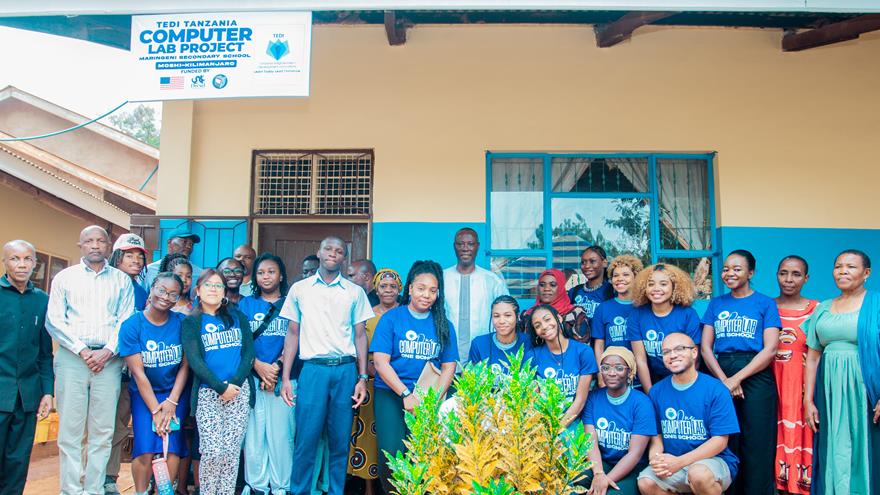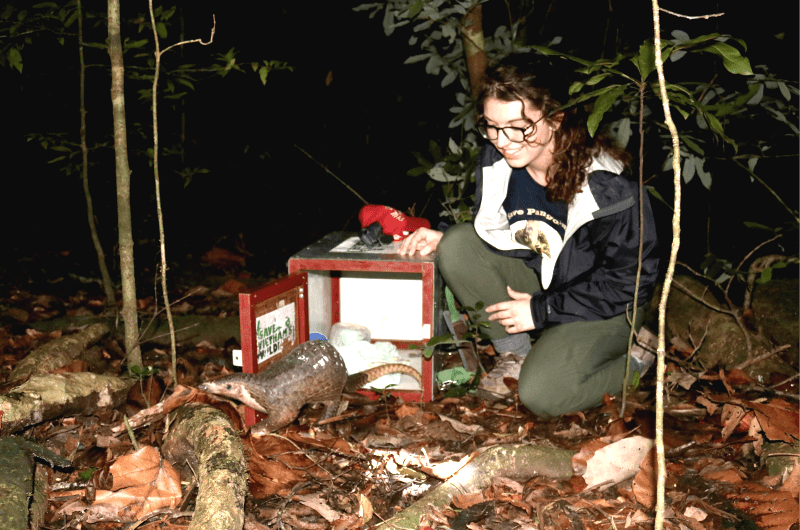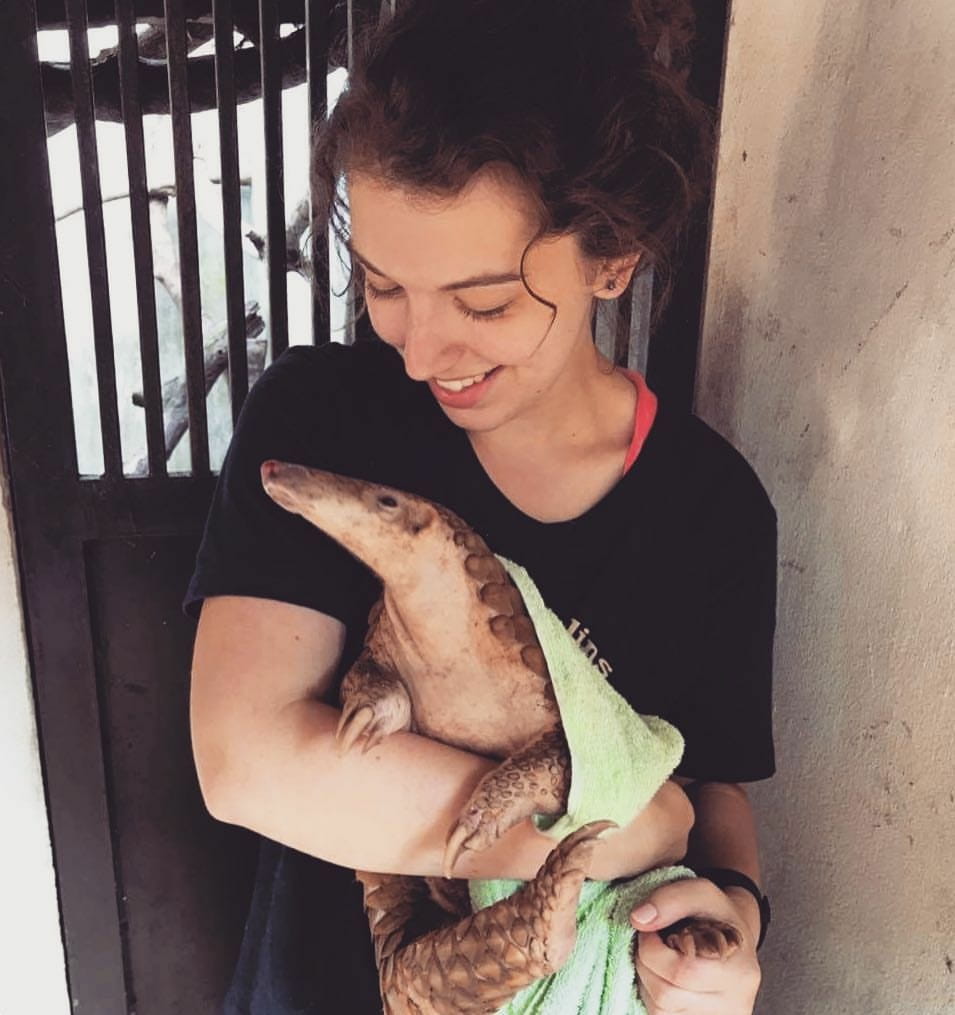Protecting the World’s Most Trafficked Animal While on Co-op
 By Ben Seal
By Ben Seal

- Through Connections and Community, Drexel Course Helps Launch Computer Lab in Tanzania
- Drexel's Self-Heating Concrete Is One Step Closer to Clearing Sidewalks Without Shoveling or Salting
- Pinging Pipes Could Help to Identify Lead Water Lines Without Excavation
- 40 Years Ago, Drexel Made Computer — and Apple — History

Ashleigh Jugan, on a pangolin release during her co-op in Vietnam.
This is one of a regular series profiling Drexel students and their co-ops.
Ashleigh Jugan, a fourth-year environmental science major in Drexel University’s College of Arts and Sciences, is halfway around the world right now working with an animal you’ve probably never heard of. The pangolin looks something like a cross between an armadillo, an anteater and a reptile — or a long-lost Pokémon. It’s also believed to be the most heavily trafficked animal on the planet. Jugan has been on a 10-week co-op in Vietnam since early April, working with Save Vietnam’s Wildlife, an organization devoted to creating harmony between people and nature in which wildlife like the pangolin can flourish.
Jugan's co-op was made possible by a Gilman International Scholarship and a Freeman-ASIA grant. She’ll be returning to campus soon, so DrexelNow caught up with her to learn more about the unusual animals she’s working with and why a concerted effort is needed to protect them from hunters and traders.
Q: What are you doing on your internship and how did you end up there?
A: I've been interested in conservation biology for some time now, but it's only been a few years since I've discovered what a pangolin is. Since I found out about these unique and threatened creatures, I have been absolutely fascinated by them. They are the most trafficked mammal in the world, yet most people don't even know that they exist. There are only a few institutions that have been successful in keeping pangolins in captivity and even fewer rescue and release centers.
Save Vietnam's Wildlife is one of the only rescue centers in the world for pangolins and one that takes volunteers. I contacted them with my interest in volunteering with them for my co-op and they were more than happy to take me for the 10 weeks this spring. The opportunities here have been endless. I absolutely love seeing the animals every day and making sure they are as comfortable as possible while at our center. I've also helped our vets with health checks and assisted them with bandage changes, treatment of eye infections and other health-related surgeries. Diet preparation and feeding is another popular activity for volunteers. All the animals at our center are nocturnal, so this process begins after dinner and well into the night sometimes. It's quite an exciting time of day to be at the center to see the pangolins, binturongs and civets, all so active.
We've also had a baby pangolin that required multiple feedings of milk and ant eggs. I would help feed her in the morning, afternoon and evening. Now she's old enough to just feed when the other pangolins do in the evening! I've also dabbled in enrichment and learned a lot about training, which includes ways to do health checks to minimize the stress on the animals. I have been and will continue to work closely with the research team here to contribute to a project exploring possible locations of the Chinese pangolin in Vietnam, and also a radio tracking project in central Vietnam. It will definitely make going home easier, having something keeping me connected to the center.

Q: How does this internship fit in with what you’ve been studying at Drexel and what you want to do going forward?
A: I'm finishing up my fourth year as an environmental science major here at Drexel. My concentration has been in ecology and conservation, though my co-ops haven't always reflected that. I've always wanted to gain diverse experiences through Drexel and I believe I have done that through different research opportunities, study abroad, co-op and organizations on campus. I value each experience I've had, but they have all reaffirmed that conservation in the field is my true passion. I knew I wanted to complete one of my three co-ops abroad in the field and I saved it for the last one when I would have the most relevant experience and classroom knowledge in order to ensure the highest appreciation and success. I am now applying to different graduate programs both in the United States and abroad focusing on conservation of illegally trafficked species.
Q: Why are pangolins so heavily trafficked?
A: Pangolins are so heavily trafficked because they are very valuable and easy to catch. They are covered in keratin scales and curl up into tight balls when threatened, which is a great defense against natural predators such as tigers. However, this makes it easy for poachers to pick them up and stuff them into a net to be sold. Pangolins are most heavily consumed in Vietnam and China where their scales are used in traditional medicine and their meat a delicacy. Because pangolins are illegal, they are seen as a status symbol.
Q: What are they like to work with?
A: Pangolins are very interesting to work with. It can be difficult at times with their natural defense being curling up into a ball when you are trying to check for injuries or give medical treatment. Even some of the weakest pangolins can curl up into an unbreakable ball, so often you have to be careful where your arm or hand is when that happens. Big males will snort at you to warn you off, but as they have no teeth, it’s not super threatening. The young ones often have less fear and will try to climb around you, constantly sniffing for ants. They are extremely good climbers using their strong body, claws and tail. I love seeing them so sleepy, curled up in a ball in the mornings when I clean, but it's truly wonderful to see them at night while they are active, climbing around the branches and feasting on their dinner of ants.
Q: What have been the best parts of the experience so far?
A: I don't even know where to begin with this question. I couldn't even describe a more ideal job for myself: out in the jungle rescuing pangolins, caring for them and bringing them back to health before they are released back into the wild. Seeing the full process, rescues, vet work, research, grant writing and fundraising and then their release has been an unforgettable experience and has truly shaped not only my career path, but me as a person. Every day I feel like I'm making a difference in the world, helping to ensure the Sunda pangolin does not go extinct. I've never worked so hard, or enjoyed a job as much as I have working here.
Q: What have been the most challenging aspects of the internship?
A: The most challenging part is lacking the proper resources to make the biggest impact possible. I learned over my time there that there are so many things that they need but aren't able to afford at the moment. There is so much heart in this center, but there is only so much you can do with what you have. Many of the animals that come into the center have wounds that are infected or have been force-fed something dangerous or are extremely underweight. Every staff member works tirelessly to ensure the best treatment of the animals brought in, and it’s only thanks to the many generous donors that we are here. Still, we are always in need of more donations.
Q: What lessons do you think you’ll bring back with you when you return home?
A: This experience has not only helped me define what I want to pursue academically but also has allowed me to explore my own personal goals and values. I feel like my entire lifestyle has changed here, from the very obvious diet changes to my materialistic ways shifting to a more minimalistic style. This internship has helped me decide what graduate school programs I will apply to in the fall and what kind of projects I will pursue. I still have a lot to learn, but I believe this experience has dramatically increased my knowledge and experience in wildlife management and conservation biology.
About the Drexel Co-op program: More than 98 percent of eligible undergraduate students at Drexel University participate in the co-op program, balancing full-time classes and up to three different internships during their time at Drexel. Students can choose from more than 1,700 employers in 33 states and 48 international locations — plus endless possibilities through self-arranged placements.
In This Article
Drexel News is produced by
University Marketing and Communications.